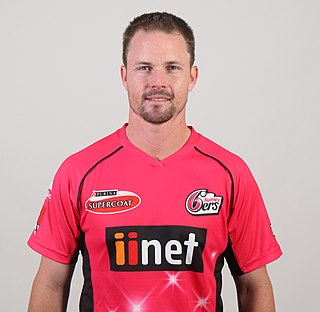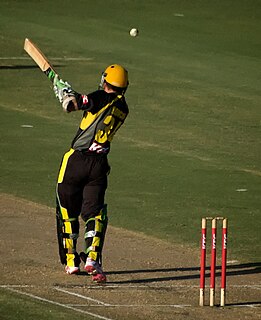
The New Zealand national cricket team represents New Zealand in men's international cricket. Named the Black Caps, they played their first Test in 1930 against England in Christchurch, becoming the fifth country to play Test cricket. From 1930 New Zealand had to wait until 1956, more than 26 years, for its first Test victory, against the West Indies at Eden Park in Auckland. They played their first ODI in the 1972–73 season against Pakistan in Christchurch.

Brendon Barrie McCullum is a New Zealand cricket coach, commentator and former cricketer, who played all formats, and also a former captain in all forms. McCullum was renowned for his quick scoring, notably recording the fastest test century of all time. He is considered one of the most successful batsmen and captains of New Zealand cricket. He retired from all forms of cricket in August 2019.

Bradley-John Watling, known as BJ Watling, is a South African-born former New Zealand international cricketer who has represented Northern Districts since December 2004. He made his Test debut in December 2009 and eight months later played his first One Day International. In 2012, Watling assumed the role of wicket-keeper in Tests.

Adam Charles Voges is an Australian cricket coach and former cricketer who played for the Australian national team at Test, One Day International (ODI), and Twenty20 International (T20I) level, and also captained Western Australia and Perth Scorchers in domestic cricket. Voges' Test match batting average of 61.87 is second behind Don Bradman among batsmen who have finished their career and played a minimum of 20 innings. Voges was included in the 2016 ICC Test Match Team of the Year.

Colin Munro is a South-African born New Zealand international cricketer, who plays limited overs formats of the game. He was a member of the New Zealand Under 19 side and is currently a member of the Auckland cricket team.

Luke Ronchi is a New Zealand-Australian cricket coach and a former cricketer. He represented both the Australia national cricket team and New Zealand national cricket team in international cricket. Ronchi is the only player to have played for both Australia and New Zealand in cricketing history and was part of the New Zealand World Cup side that finished runners-up in the 2015 Cricket World Cup, after their defeat in the final to Australia. He played for Wellington in New Zealand domestic matches and has played Twenty20 matches for a range of sides. He retired from international cricket in June 2017.

Kane Stuart Williamson is a New Zealand international cricketer who is currently the captain of the New Zealand national team in all formats. He is a right-handed batsman and an occasional off spin bowler.
The Indian cricket team toured New Zealand from 25 February to 7 April 2009, playing a Test match series with New Zealand for the first time in five years. The tour included three Tests, five ODIs and two T20Is. New Zealand won both the T20Is. India won both the ODI series 3–1 and Test series 1–0.
The Zimbabwean cricket team toured New Zealand from 26 January to 14 February 2012. The tour consisted of one Test, three One Day Internationals (ODIs) and two Twenty20 (T20) matches.
Thomas William Maxwell Latham is a New Zealand cricketer who represents New Zealand in all formats of the game. He is also the vice-captain of the side in Tests and ODIs. In January 2020, Latham captained the New Zealand Test side for the first time.
The West Indies cricket team toured New Zealand from 3 December 2013 to 15 January 2014, playing 3 Tests, 5 One Day Internationals and 2 Twenty20 Internationals against New Zealand. New Zealand won the three match test series 2-0 and the T20Is 2-0. The ODI series was drawn 2-2.
The India cricket team toured New Zealand, playing a five-match One Day International (ODI) series and two Test matches against the New Zealand national team from 19 January to 18 February 2014.
The Sri Lankan national cricket team toured New Zealand from 26 December 2014 to 29 January 2015 for a tour consisting of two Test matches and seven One Day Internationals. New Zealand won the Test series 2–0 and the ODI series 4–2.

Pool A of the 2015 Cricket World Cup took place from 14 February to 14 March 2015. The group consisted of co-hosts Australia and New Zealand, and along with them, England, Sri Lanka, Bangladesh, Afghanistan and Scotland. This phase of the tournament was played as a full round-robin between all seven teams, with the top four teams, New Zealand, Australia, Sri Lanka and Bangladesh, advancing to the quarter-finals.
The New Zealand cricket team toured Australia from 23 October to 1 December 2015 to play three Test matches and four tour matches. The third match of the series at the Adelaide Oval was the first ever day-night Test. Michael Hussey captained the Prime Minister's XI side for the tour match, and in preparation for the day-night Test, a pink ball was used in this game. Australia won the series 2–0, with victories in Brisbane and Adelaide, with the second Test in Perth being drawn.
The Sri Lanka cricket team toured New Zealand in December 2015 and January 2016 to play two Test matches, five One Day Internationals (ODIs) and two Twenty20 Internationals (T20Is).
The Pakistani cricket team toured New Zealand in January 2016 to play three One Day Internationals (ODIs) and three Twenty20 International (T20Is) matches. New Zealand won the T20I series 2–1 and the ODI series 2–0.
The Bangladeshi cricket team toured New Zealand from December 2016 to January 2017 to play two Test matches, three One Day Internationals (ODIs) and three Twenty20 International (T20Is). New Zealand won both the ODI and T20I series 3–0 and won the Test series 2–0.
The Australian cricket team toured New Zealand in January and February 2017 to play three One Day Internationals (ODIs).







